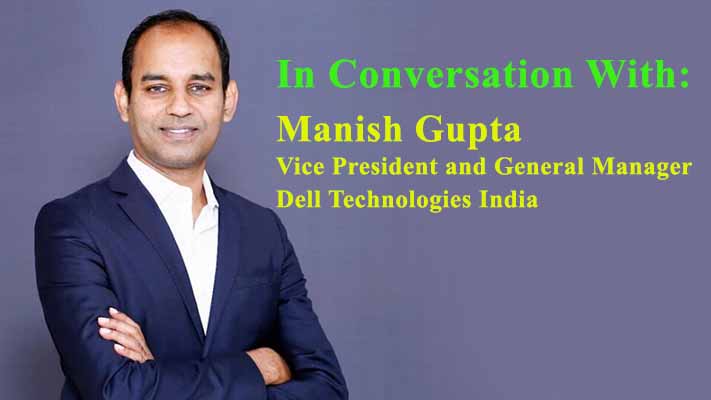Dell Technologies has been the pioneer in providing holistic enterprise solutions especially in multi-cloud. Dell Technologies develops and offers multi-cloud solutions. These solutions are not only integrated in terms of storage but also when it comes to security and management. TimesTech interacted with Manish Gupta, Vice President and General Manager, Dell Technologies India to learn more about Multi-cloud.
TimesTech: Why do you think multi-cloud is necessary in today’s time? Is it sustainable?
Manish:The way IT is used in an organization has evolved in the last couple of years. With the digital transformation accelerating, organizations today manage multiple cloud platforms. This mix of public, private and hybrid cloud offers tremendous benefits like increased flexibility. Enterprises today are adopting newer technologies like AI and advances analytics and are finding insights from data real time. This has also resulted in IT getting closer to where the data is generated driving application portability. This allows the application to be hosted out of anywhere whether its Edge cloud where data needs to be analysed real time or at core DC where the data is analysed to identify patterns and streamline efficiency.
As this evolves, it is often observed that not all applications are suited for a given cloud solution. This results in a situation where there are overruns in budgets. Application efficiency around latencies and security becomes one of the key parameters in this strategy.
Any organisation which is then able to overcome the challenges mentioned above like fragmented, disconnected processes and multiple siloed tools will master the art of multicloud adoption.
Apex– from Dell Technologies with a holistic solution. It is aimed to eliminate these complexities and help organisations get the best out of multi-cloud. Further, it helps them propel themselves in the digital transformation journey pivoting into exponential growth.
TimesTech: How can Indian businesses develop a cost-effective model by shifting their workloads to service providers using multi-cloud services?
Manish: Cost efficiencies are a factor that needs to be well thought of while evaluating a multicloud strategy. One of the ways is to assess and determine the workloads that need to be shifted to cloud. Many factors play a key role in this, for example: Application efficiency with repect to latencies, scalability and flexibility. Identifying the right workloads for the right cloud will assist in building an overall adoption methodology. That can guide organisations to get the best of this multicloud service.
The next step is to identify the service provider who meets these requirements tailored to different wokloads in the IT landscape.
Ability to have a consistent experience amongst the tools and processes will play a key role as well. Cost evaluation is a continuous process. It needs to be monitored at regular intervals to ensure the environment is running optimally.
With Dell Technologies’ wide range of services, businesses can take advantage of varied services solutions. The new Infrastructure-as-a-Service solution in the form of Dell-VMWare Cloud Platform gives organisations the ability to move workloads across multiple cloud environments and scale resources quickly with predictable pricing and transparent costs. Not only will they derive IT insights from a market leader like Dell Technologies, but they will also be able to manage their processes at a higher efficiency while engaging the workforce in organizational innovations.
TimesTech: How can businesses overcome storage related challenges with multi-cloud? What is Dell doing to enable this?
Manish: Multi-Cloud architecture is the ideal approach today as enterprises seek to manage workloads across public, hybrid and on-prem resources. This brings the ability to choose the right cloud for the right application. This also inadvertently results in a great deal of complexity to manage multicloud storage.
Dell Technologies has an innovative suite of solutions that integrate with cloud infrastructure with ease, improving efficiency while ensuring a familiar management experience. There is commonality and no loss of features advantage and benefits that our customers are already using in their traditional on-prem deployments.
There are significant benefits that enterprises gain with Dell Technologies validated designs for multicloud storage solutions, they can:
- Accelerate time to value with pretested infrastructure and deployment guidance
- Improve performance with independent scaling of storage
- Leverage existing investments in multicloud infrastructure.
Dell Technologies offers Storage as a Service which simplifies the connectivity to our best of breed enterprise class storage solution to the cloud of choice.
Proof of value lies when enterprises can:
- Take advantage of enterprise-grade data security, capacity, availability and replication in the public cloud
- Maximize security and control over the cloud data
- Leverage public cloud resources and switch between them depending on the needs of applications and workloads
TimesTech: What is the importance of data strategy to drive a company’s successful cloud implementation?
Manish: Data is one of the key assets of an organisation. It is the insight that gets identifies from this data that fuels growth and creates competitive differentiation. Mutli-cloud can deliver on this ask, and yet this does not balance the risk and challenges around data management.
There are security risks that need to be mitigated or thought through to ensure the organizations assets are not compromised. This brings in the need to holistically bring in a strategy on how one handles data within the organization. How its protected, monitored, managed and yet not lose control of the data whether its your or your customers data.
Apart from these, there are data governance policies that may need to be adhered to like GDPR or HIPAA. This warrants not only data security but also audit requirements as to where the data resides and who and how its processed.
A good data strategy needs to ensure all of the above points to have a well-rounded in a multicloud world.
TimesTech: How can data on the multi-cloud be secure?
Manish: Security is of utmost importance, whether on-prem or on clouds. The attacks today are more concerted and enacted as a project. in Multicloud era, where the data moves across these clouds, it becomes even more critical for organisations to have a strategy around security. Security plays a key role in defining business resiliency.
One of the ways is to follow a Protect-Detect-Recover strategy.
Organisations should be able to protect their data and environment using multiple tools and solutions to ensure they are safe from the known attacks.
In case there is an attack, one should be able to detect and take action, whether isolate the environment there by limiting the attack. Ability to ensure the pristine back up copy of data to be safe and not hampered needs to be part of the plan.
The ability to recover from this attack to the last best copy and keep the business on becomes the next big step in the strategy.
Meanwhile, Dell Technologies has a suite of solutions and services around these technologies to ensure a well-protected environment for data in this multicloud era.













